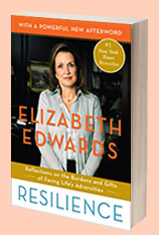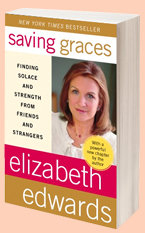- MAIN
- |
- Q & A
- |
- REVIEWS
- |
- EXCERPT
- |
- READER'S GUIDE
An Interview with Elizabeth Edwards,
author of Resilience: Reflections on the Burdens and Gifts of Facing Life's Adversities
May, 2009
Broadway Books: How did you find the courage to write this book?
Elizabeth Edwards: I am not certain courage is the right word. Maybe defiance is a more accurate description. When I first decided to write the book, I thought I had found my balance enough to write it. But between that time and the actual writing I was knocked off the beam again. I thought I could not write, but then it seemed that if I let obstacles take part of my life, or my voice away, I had lost the struggle I was trying to win. If there was courage in there somewhere, it was wrapped fully in defiance.
Broadway Books: How did the experience of writing Resilience compare to the writing of Saving Graces?
Elizabeth Edwards: Writing a chronological narrative was a much easier experience. Although there were certainly difficult subjects in Saving Graces, it was also almost joyful to write—like a trip down memory lane. Resilience was much more difficult because I had to focus all my energies on those difficulties.
Broadway Books: Is it a relief to be out of the political realm, or do you miss it? What advice would you have for the new President and First Lady about being resilient?
Elizabeth Edwards: I have only my own example as advice, which is an example I hope that the Obamas will never be in a position to follow. I do miss the opportunity to talk to people about their real life problems. I still talk about health care as a Senior Fellow with the Center for American Progress, so I get my political “fix” that way.
Broadway Books: How were you shaped by living abroad as a child? What did it teach you about the universal nature of resilience—the common threads that transcend cultural differences?
Elizabeth Edwards: Resilience is so much easier if what we are talking about is having a problem but getting to deal with that problem in our home or apartment in the United States, having clean water and public schools. Living abroad has given me both an appreciation of what we have here and a perspective on my own struggles, which, when viewed against all of life's struggles everywhere, are small indeed.
Broadway Books: It was brave of you to write so candidly about the deep hurt you felt when you learned of your husband's indiscretion. Did you consider omitting those scenes from Resilience? What do you hope that readers (perhaps those who have been in your shoes) will take away from your experience?
Elizabeth Edwards: I knew that it would be a form of dishonesty to omit those pains. I considered not writing the book at all—in fact, I had decided not to write—because I did not want to reopen the story. When I settled on writing only my part of the story, I felt I might try to write something with which others—those who have experienced from my viewpoint or from my husband's—might relate and from which they could derive some understanding or comfort.
Broadway Books: You freely admit to being sensitive and sentimental, enjoying the beautiful lyrics of music from your parents' generation and savoring poignant lines of poetry. What would you say to those who think that being emotional interferes with resilience?
Elizabeth Edwards: I am a believer in doing what you need to do to get through life's obstacles. If I wanted to sit and listen to This Shirt by Mary Chapin Carpenter, which I always had queued up on the CD player in the car when I picked Wade up from school (we didn't agree on much music, but we agreed on that song), then I should do that. It is only when someone gets stuck in the emotional, allowing the emotional escape to be a permanent denial, that a problem can arise. But not allowing your emotions to have their day is just as problematic.
Broadway Books: In the book, you describe how your spiritual life has been transformed in recent years. How has your illness affected your fundamental outlook on life?
Elizabeth Edwards: What my illness has taught me is less about my view of life (I learned all I needed to learn about the preciousness of life at Wade's death); it more about the incredible strength and humor and resilience of the women and men who share my disease. It has been a blessing to be part of this supportive, beautiful sisterhood.
Broadway Books: You recall a luncheon at the Cleveland City Club, where a woman whispered to you that she had found a lump in her breast but had no insurance and therefore couldn't afford to get it checked. This inspired you to become more vocal in supporting healthcare for the uninsured. What do you recommend for readers who want to help with this cause and “fix the system”?
Elizabeth Edwards: As Congress starts to consider health care reform, it is important to make our views known. The problem is that so many of those with inadequate care are the least likely to be in contact with their representatives. Write your Senator, call your Congressional Representative, attend one of the town halls being held across the country, and tell them what problems you have faced and what you need from your health care system. Sometimes we think our own stories have no value, but anecdotal evidence of gaps and obstacles often have the most impact on the men and women who are trying to fashion a remedy.
Broadway Books: You write, “I had to find a partner bigger and stronger and more important than my own cancer. I was lucky, for I had been dancing with that partner for years,” a sentiment echoed in later scenes of your mother and father. How did your parents' marriage influence yours?
Elizabeth Edwards: My parents were in so many ways pictures of resilience, each individually and as a marriage. My mother was a Navy daughter and twice a Navy wife. My father was a career Navy pilot. They each had a vision of service to our country and in tough times they focused on doing that well, letting themselves heal in personal ways.
Broadway Books: You describe what it was like to discover your mother's journals. What do you hope it will be like for your children to read Resilience later in their lives?
Elizabeth Edwards: In a real sense I wrote this book for my children. There is now a myth about what their family has been through and I wanted, particularly because of my health, to write my own version where they see not salacious outlines but abiding love. They will also learn, I hope, that life is work. You cannot just walk through it, grabbing whatever you want. You have to decide what you want and what you want to accomplish and then you have to get about the very hard work of putting that together.
On Sale: June 29, 2010
Price: $16.00
ISBN: 978-0-7679-3156-4

|
|||||||
On Sale: August 14, 2007
Price: $14.95
ISBN: 978-0-7679-2538-9

|
|||||||
Enter your e-mail address to find out about new releases



